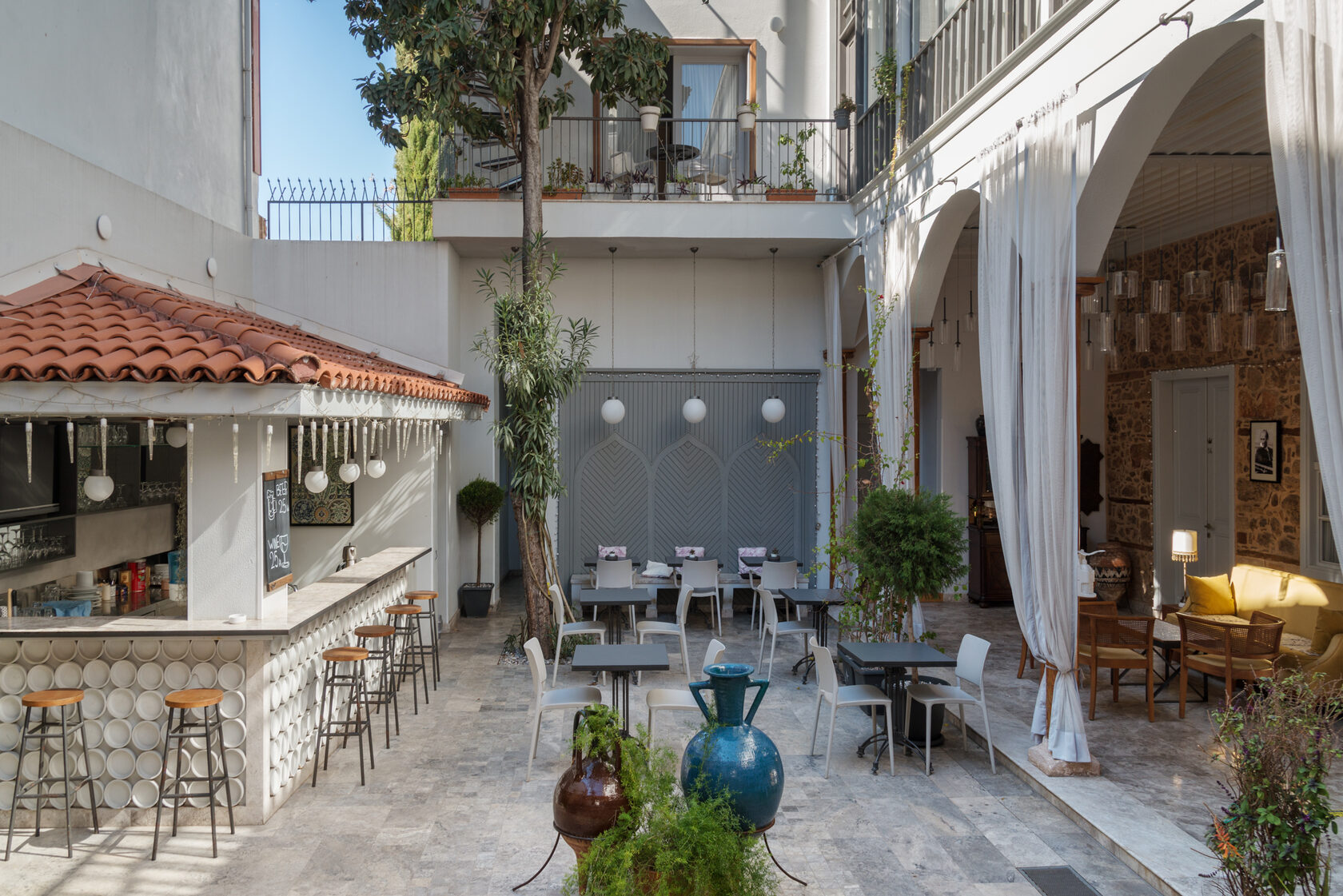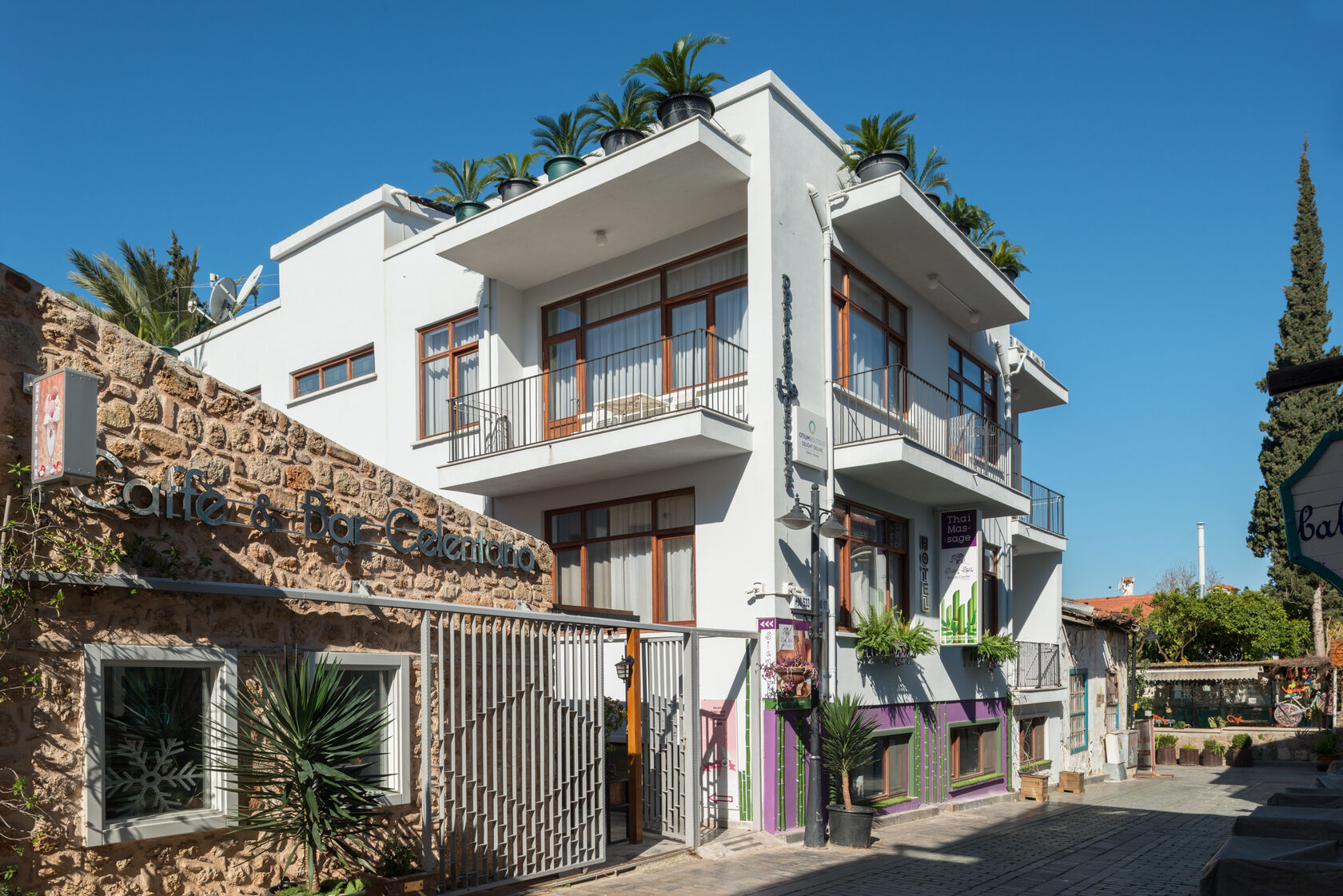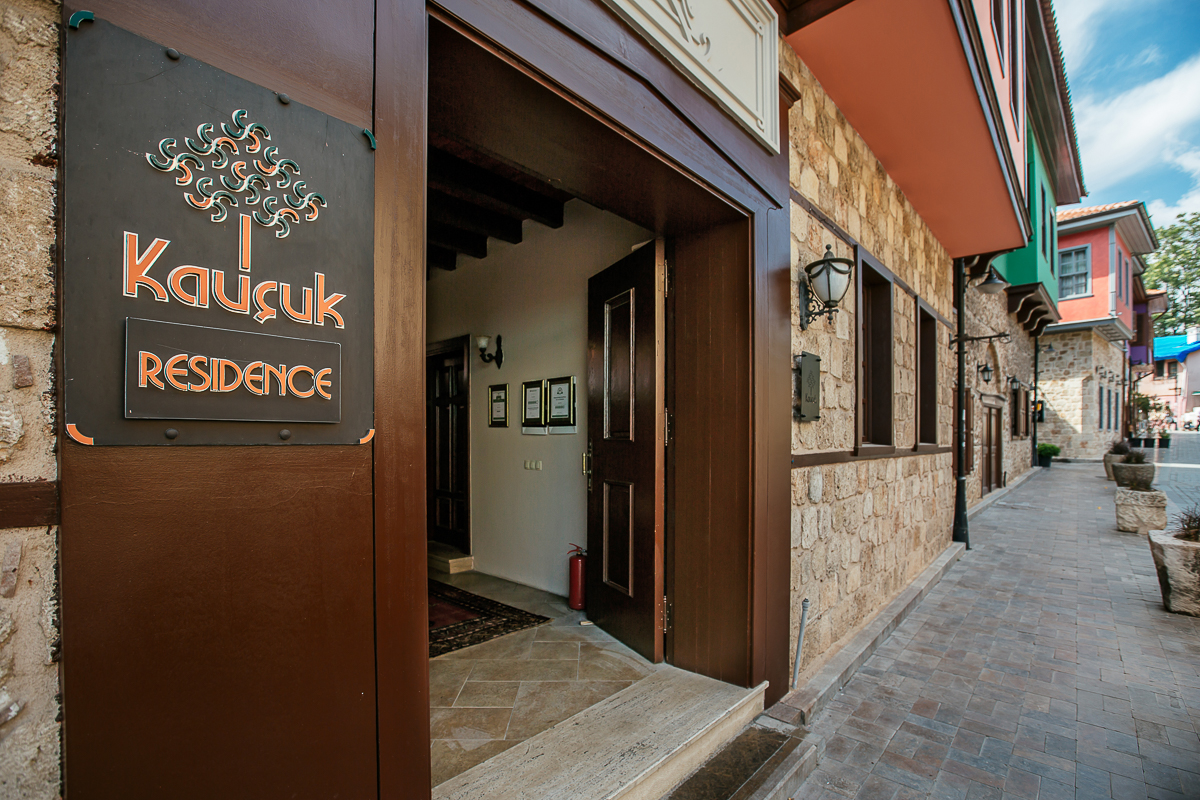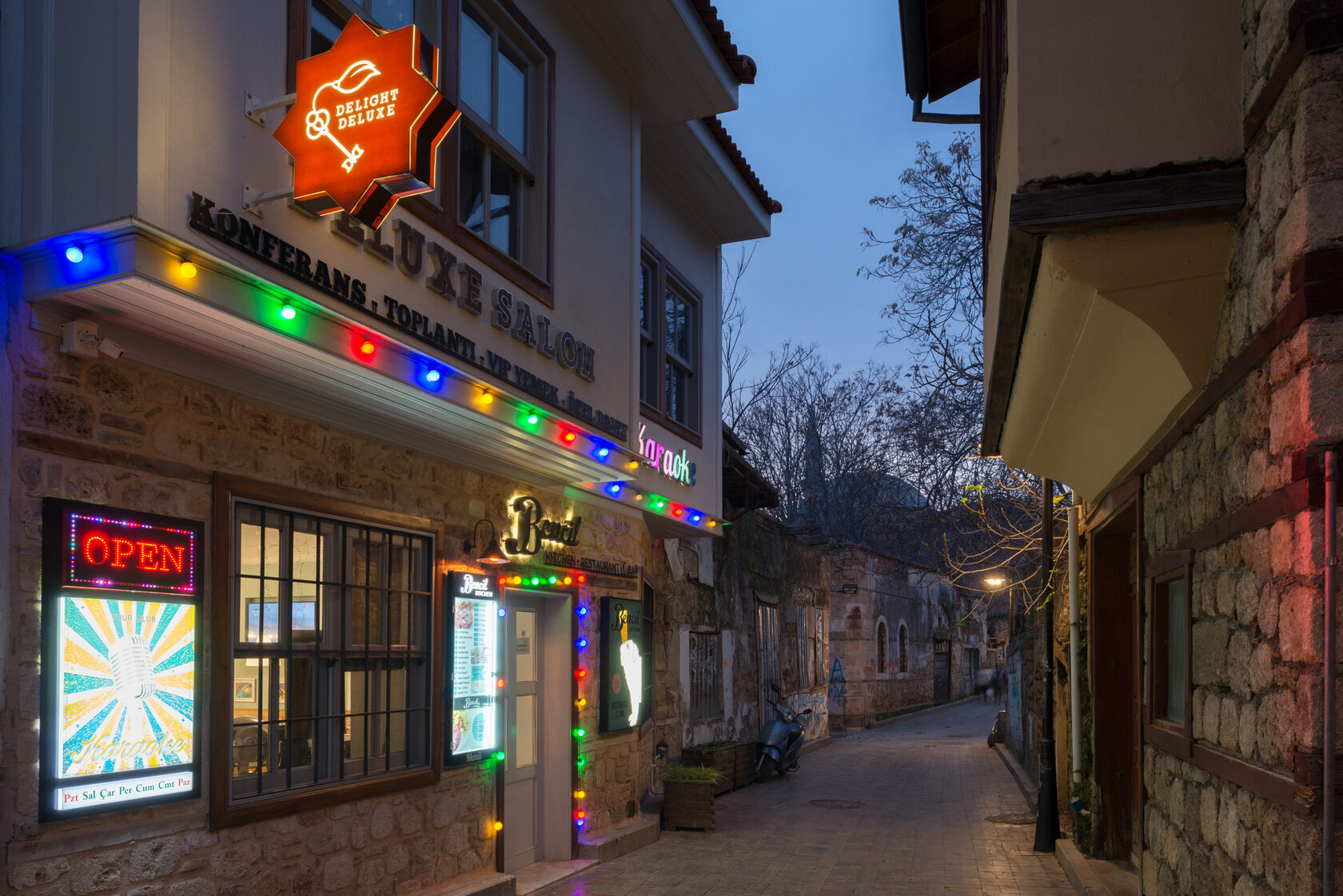
Luxury Hotel
Antalya, Turkey
Antalya, Turkey
Мы предлагаем вам прекрасный отдых, где вы почувствуете историю Калеичи

Delight Deluxe Hotel
For your comfort, our hotel has thought all kinds of room options.




Room types


Time Travel and Relax




We are located in the Old Town square, the heart of Antalya, just a short walk to the most beautiful cove in the city, which has a sandy beach and yacht marina, and a promenade with beautiful views of the ancient walls and gardens of the city, all tucked away from prying eyes. The famous Hadrian's Gate, the pride and beauty of Antalya, is just fifty meters away. The International Airport can be reached within 20 minutes, and for our guests we have an organized shuttle service, which is included in our list of services.
Delight Deluxe Boutique Hotel is situated in a historical mansion, with its own enclosed grounds with a garden, swimming pool and bar-restaurant. The stonework, high ceilings and spacious halls combine with the modern comforts to give the sensation of living in a castle - a timeless exotic.
The rooms are tastefully furnished to a high standard and the visual surroundings are equally appealing.
The rooms are tastefully furnished to a high standard and the visual surroundings are equally appealing.


Delight Deluxe
Relax with family and friends.
Plus, have a good time
Plus, have a good time
Enjoy peaceful gardens and comfortable apartments
171 seconds from your hotel and you're on the shores of the Mediterranean
Meet the
Our Hotels
The graceful Kauçuk Otel welcomes you with harmony and tranquility of its facades



Celebrity guests Delight Deluxe Hotel


WELCOME TO DELIGHT DELUXE, THE IDEAL SEASIDE HOTEL FOR A HOLIDAY IN WELCOMING AND LUXURIOUS SURROUNDINGS!

The interior design is elegant without being overly decorative, with a slight hint of spice and the use of authentic artifacts.
Each room is individually color-coordinated, as are the textiles, decorations and designer furniture in precious wood. Each piece of furniture in our hotel is made especially for the boutique hotel and is unique, of which we are proud. All ground floor furniture is made of mahogany and ground floor furniture is made of white washed oak. The flooring on the ground floor is natural wood planking and on the first floor ecological jute carpet.
Each room is individually color-coordinated, as are the textiles, decorations and designer furniture in precious wood. Each piece of furniture in our hotel is made especially for the boutique hotel and is unique, of which we are proud. All ground floor furniture is made of mahogany and ground floor furniture is made of white washed oak. The flooring on the ground floor is natural wood planking and on the first floor ecological jute carpet.





Our Services
Our services for our valued guests at our hotel
Photographer
Swimming pool
Surrounded by snow-white oleander trees you can swim in the pool, relax on the sun loungers and try spinning the wheel of the ancient well.
Transfer
Guests can use the VIP shuttle service from the airport to the hotel


RESIDENCE PERMIT
We will assist you to complete your residency package
Providing photo and video services, individual photo shoots
Dentistry
We cooperate with a dental clinic and will be happy to advise our guests














Enjoy a delicious meal at the Bencil Restaurant with a wide selection of food and wines. Experience the romantic and historic atmosphere of Kaleici at Bencil Kitchen.



Guest reviews
Отличный отель. Расположен на тихой улочке старого города. Номера очень стильные, есть бассейн.
Внизу есть бар, можно выпить вина, пива. Русскоговорящих персонал, что для меня, человека не знающего английского очень хорошо. :)
Отель очень понравился. Однозначно вернусь сюда ещё.
Внизу есть бар, можно выпить вина, пива. Русскоговорящих персонал, что для меня, человека не знающего английского очень хорошо. :)
Отель очень понравился. Однозначно вернусь сюда ещё.
Красивый, уютный, колоритный отель, очень стильный и сделанный с любовью.
Для тех, кто хочет пожить в самом сердце Анталии - старый город района Калеичи с его мощеными узкими улочками.
Для тех, кто хочет пожить в самом сердце Анталии - старый город района Калеичи с его мощеными узкими улочками.
Прекрасный маленький отель , интерьер продуман до мелочей Было тихо и очень уютно. Персонал очень заботливый. Есть небольшой, но очень чистый бассейн. Расположение отеля очень удобное, в районе старого города. Рядом много недорогих кафе. Обязательно вернемся еще!!! Спасибо за прекрасный отдых.
Недавно посетил великолепный бутик в старом городе! Все очень понравилось! Полное соответствие цены и качества! Отличный номер с видом на море и весь старый город, выход на крышу. Всю красоту не передать словами. Обслуживание по высшему разряду! Завтраки более чем вкусные и разнообразные. Приветливый персонал. Во дворе находится бассейн с шезлонгами. Все очень красиво и шикарно. Недавно открылся спа с хорошим хамамом и настоящим турецким массажем! Очень понравилось. С женой тусили там больше двух часов! Огромное спасибо всему персоналу Delight Deluxe за отлично проведённое время и великолепный отдых! Обязательно вернемся!
Отдых по работе. Есть красивые места. Приветливый персонал. Экзотические места. Очень близко к отличному парку и другим достопримечательностям. Рекомендую. В стоимость входит завтрак. Кормят вкусно, а турецкий кофе - пальчики оближешь.
As Delight Deluxe Hotel, we take full responsibility for adhering to ILO Standards throughour efforts in waste management, natural resource utilization, health and safety foremployees, child protection, and the recognition of equal rights, all aimed at minimizing theimpact of tourism on our environment. We believe that our work in integrating with thecommunity and addressing social issues contributes to the sustainability of tourism. We arecommitted to the efficient use and management of natural resources, which we consideressential for ensuring tourism sustainability. Through our environmental initiatives, we aim tobecome a model establishment in the hospitality sector in the Southeastern Anatolia region. Our goal is to provide high-quality services, promote economic growth, protect theenvironment, encourage community involvement, and, of course, create employmentopportunities by complying with all existing environmental laws, regulations, and standards. We will define our environmental goals and objectives, continuously improve ourenvironmental performance, and minimize the impact of our activities on the environment. We will raise awareness about environmental issues among our employees, guests, suppliers, and the community at large.
Under this policy, our main implementation headings are listed below:
1. Planning and Framework Establishment
Under this policy, our main implementation headings are listed below:
1. Planning and Framework Establishment
- Adopting the green hotel concept as a part of our operational policy,
- Appointing a knowledgeable staff member as the environmental managementdirector to implement necessary practices,
- Forming an environmental working group or "green team" by selecting one staffmember from each unit,
- Measuring and recording the water and electricity consumption of our guests.
- Organizing a training program for all hotel staff to adopt the green hotel concept,
- Strengthening staff awareness through regular meetings and feedback,
- Motivating staff by creating healthy competition,
- Continuously providing refresher training and sharing results with staff as theprogram progresses.
- Identifying management alternatives and deciding which to implement, whileassessing the hotel's environmental impacts,
- Monitoring and controlling the consumption of units with high energy and waterusage,
- Tracking progress based on consumption and units regularly on a daily, weekly, and monthly basis,
- Setting short- and long-term goals and implementing corrective actions iftargets are not met,
- Collaborating with other hotels and businesses to elevate environmentalstandards in the destination or region where the hotel operates,
- Informing guests about the hotel's environmental policies.
- Preferring sustainable products,
- Opting to purchase from local producers,
- Choosing seasonal and local products,
- Reducing packaging costs by buying in bulk,
- Supporting fair trade and eco-labeled products,
- Not selling products derived from protected species or banned trade items.
- Ensuring that local communities benefit from our activities,
- Choosing services provided by the local community,
- Employing local residents,
- Supporting projects that develop the local community.
- Supporting projects that protect cultural heritage and nature,
- Showcasing art and handicrafts produced by the local community,
- Educating guests about local culture and appropriate behaviors,
- Preventing pollution and noise,
- Promoting suitable transportation options to reduce energy consumption andemissions.
- Identifying areas with high energy and fuel usage,
- Designating personnel to collect energy data,
- Implementing small changes to achieve energy savings,
- Maintaining all devices to ensure they operate effectively,
- Opting for low-energy-consuming alternatives,
- Continuously monitoring the hotel's environmental performance and settingrealistic targets based on results.
- Identifying areas with high water consumption and determining how to reduceit,
- Implementing small changes to save water,
- Regularly checking pipes and faucets to promptly fix leaks,
- Installing water filters and devices that reduce consumption in the hotel'skitchen, bathrooms, and other areas.
- Separating waste into categories such as paper, plastic, glass, etc.,
- Researching the amount of waste and its recyclability,
- Preparing a waste management plan and tracking its outcomes,
- Implementing wastewater treatment methods.














